Helen Lowe's Blog, page 278
November 21, 2011
Tuesday Poem: Haiku—"Hanging Out Washing"
hanging out washing —
one coloured peg
in a line of weathered wood
.
© Helen Lowe
Published in a fine line, New Zealand Poetry Society, March 2007
—
About the Haiku:
It's been a wee while since I've featured a haiku so I thought I'd put one up for today.
(As above) 'hanging out washing' was published as a Kiwi Haiku (Ed. Richard von Sturmer) in the NZ Poetry Society journal a fine line in 2007—although I hadn't realised what a very Kiwi theme it was until a friend who has travelled widely, and lived and worked in many different countries, remarked that in fact hanging out washing is no longer as universal a practice as NZ-ers might assume (ie washing machine/dryer is it in many places now): let alone the 'lone wire and pole' version of the washing line (the standard of my rural childhood) that this haiku celebrates.
In terms of choosing this particular haiku for today, I know that it is coming up for Thanksgiving in the US right now, and to me this poem (since a haiku is a form of poetry) is all about being in the moment with, and by extension giving thanks for, all the small, simple goodnesses in life: like the bravura splash of that one coloured peg (it was red, by the way), as well as for the weathered wood and the cheerful snap of the washing against blue sky—which is in itself a way of giving thanks just for being here. And this year, that on it own has felt like a pretty big deal.
Little poem, big speil, huh? But the haiku, I hope, stands on its own.
—
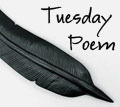 To read the featured poem on the Tuesday Poem Hub and other great poems from fellow Tuesday poets around the world, click here or on the Quill icon in the sidebar.
To read the featured poem on the Tuesday Poem Hub and other great poems from fellow Tuesday poets around the world, click here or on the Quill icon in the sidebar.
November 20, 2011
In the Spirit of Poe and Proofing …
Check this out—my fellow Supernatural Undergrounder, AA Bell has a post up now on "Editing: How Much is Too Much In The Pursuit of Perfection?"
How apposite is that? I have to say, that when I first saw it yesterday it felt very apposite indeed given a big part of what I have been realising over the past ten days, with the first pass proof for The Gathering of the Lost, is that you can definitely over-edit. And that is a big part of what I meant on Wednesday 16, here, about not losing the (already) good in pursuit of the perfect, ie yes, if one works on something forever, one might get it to a state of nigh perfection. Or one might kill it completely dead. And even if you don't (kill it dead that is), the chances are that the revisions are only working on somewhere between 1-10% of the whole—and the other 90-99% is already more than good enough to be shared wth the world. So my motto as I got into the proofing process quickly became: I'll only change this if there is a strong/compelling reason to do so, rather than thinking: "If only I xyz, maybe this could be even better …"
(And if I work on it for the rest of my life maybe it could be absolutely perfect (& no one would ever get to read it): yeah, right!)
But back to AA's post: Where does the Poe come in? Well, AA uses a quote from Edgar Allen Poe's The Raven to illustrate all the various editorial options—and it is rather fun to see what she does with it, so I invite you to head on over and do just that, here.
(I have suddenly been struck by a dreadul fear that this is something only a writing geek—I will not say nerd—would appreciate. But oh yes, that's right, I am a writing geek, so who cares if my geek-gal slip is showing: anyone who visits this blog knows that about me already!  )
)
November 19, 2011
Proof Is Done
As of 11 pm last night the proof was officially 'done'—I had gotten from the first line to the last (that's Z in the Glossary.)
Today will be spent going through and checking that everything is in order, and redoing any particularly murky chapters–but at this the manuscript should be in the courier tomorrow.
Yahoo!
November 18, 2011
Writing Process Oddments
Still proofing—although the end is in sight: yay!
There's not a lot more to say about proofing itself, other than that it's line-by-line work that requires a great deal of concentration and so is also quite exhausting, especially given the tight timeframe for "doin' the thing" in.
Mind you, a great deal of the writing process is intensive, only in different ways—for example, the line-by-line fine detail checking of the proof is a whole different universe than getting out the first draft, when there is this huge idea in your head and a blank page or screen in front of you, and the need and desire to transpose the former to the latter in a way that is true and retains fire and passion and colour—i.e. that is a tale worth reading as well as telling.
In the first draft phase I find that I do a lot of other creative things as well: not just reading, but listening to music, working in the garden, going for long walks—these are all activities that I find nourish creativity. As does a glass of wine and good conversation with friends, or a road trip to some colurful and vibrant, or wild and beautiful place.
Getting through the proofing is almost the opposite. Coffee, I find, becomes a staple, while magazines supersede books as reading material: the sort of magazines that are light on words but big on photo shots of the beautiful and picturesque (I'm talking about landscapes, design, and food here folks, by the way, not people!), easily picked up while you're waiting for the coffee to brew—and then as easily put down again. In terms of conversation, this is a time when the passing word for, and brief quality time with, the cat comes into its own. As for long walks, or walks at all—who needs them when one can restrict oneself to the twenty or so paces between the front door and the letter box? 
So there you have it—a few thoughts on the the mechanics of getting through the varying different stages of the writing process!
November 17, 2011
Fun Stuff, Not Proofing …
Yup, still a-goin' with that thar proofin' …
But rather than focusing on that I thought I'd point you toward a few fun things for today's post, as in:
The Supernatural Underground where Kim Falconer is discussing Vampire Evolution—from soul sucking fiends to sparkly romantic leads. To check out what she has to say and perhaps add your mite to the conversation, click here
It may be vampires on the Supernatural Underground, but Ripley Patton is making Notes to (Her)Self for a Zombie Apocalypse—and how to survive the same. Worth checking out if the possibility of World War Z is on your mind, here
Another interesting post lately was an interview with NK Jemisin (The Hundred Thousand Kingdoms et al) and David Anthony Durham (Acacia) titled "If Tolkien Were Black"—both talking about their own experience and stepping outside of Northern European culturo-mythic history in creating Fantasy, particularly epic fantasy. Definitely worth a read, here.
As for that proofing—I'll let you know how it's all going tomorrow!
November 16, 2011
Still Proofing!
Yes, still hard at it—and fell 12 pages short of my target for yesterday. That is because I found stuff—like repetition: of words, sure (the same word used 3 times in the same paragraph—I ask you!); but in one instance exactly the same phrase had been used on sequential pages. How can that still be there, I wondered …
I have also found a couple of continuity errors. Yes, real ones, including a character—whom we shall call 'Redshirt Y'—who was 'done for' in Part 2 but resurfaced in Part 4. Very, very tricky. Needless to say, 'Redshirt Y' has now transformed into 'Redshirts 'X' and 'Y' ', but this process did require some careful tweaking.
And I caught a character who is supposed to know the environment they are in like the back of their hand, asking someone for directions. For reasons of plot convenience, of course, but truly, such glitches, once detected, cannot be countenanced!
And this, dear friends, is why we proof: because after several drafts, the edit round, and the copyedit process, these things are still in there, lurking, and waiting to disconcert the puir, unsuspecting reader!
Wish me luck for hitting 'page target–plus 12′ today!
November 15, 2011
I'm In Proofing Mode!
'First Pass Proofing', in fact, for The Gathering of the Lost—which is the time when I get to have my final look at the manuscript, hunting for errors, from typos and missing punctuation, missing words etc, through to the final chance to plug any continuity or character errors that may still be lurking in the manuscript.
As always, the turnaround timeframe is incredibly tight, hence the shortness of this post as I focus on staying 'head down and tail up.' I am also concentrating on not letting the quest for the perfect end product become the enemy of what is already good—always a sound principle at this stage of a project.
And overall, I have to say that there is a lot here that is good. The Gathering of the Lost story is definitely rocking along. (Happiness!  )
)
But first pass proofing is also a process of considerable trepidation, because despite this electronic age, proofing is still done by hand, in coloured pencil, onto a single-spaced manuscript—which gives a whole new dimension to the phrase "reading between the lines."
Especially, dear readers, when what has to be read and made sense of from between those lines is my handwriting, which once famously gave rise to the query: "is that handwriting, or did a cockroach just run through the inkwell and all over the page?" 
So in fact, we're talking about considerable trepidation here, on my part anyway, as to what the end result will be!
But there you have it, a brief soliloquy on the vagaries of proofing—to which, right now, I had best return else I shall not make that oh-so-tight deadline!
November 14, 2011
Tuesday Poem: "Orison"
~ a Meditation on Katherine Mansfield,
in the south of France
A bell calls on sleepy air
resonant
with late afternoon
sheep click & clack
over cobbles
the smell of fleece
hangs on the hour
an olive tree taps
against glass –
through twig and leaf
there is sea, bright
beneath a blaze of sky
the page on the desk
is blank, the pen
a burden to the hand –
she lifts it
draws in breath
…………..will again
until the final line
.
© Helen Lowe
~ published in Takahe 62, 2007
—
 To read the featured poem on the Tuesday Poem Hub and other great poems from fellow Tuesday poets around the world, click here or on the Quill icon in the sidebar.
To read the featured poem on the Tuesday Poem Hub and other great poems from fellow Tuesday poets around the world, click here or on the Quill icon in the sidebar.
November 13, 2011
Book Giveaway Result: An Interview with "Oracle's Fire" Author, Mary Victoria
 On Friday, I featured an interview with Mary Victoria, author of the recently released Oracle's Fire and the Chronicles of the Tree trilogy, which you can read in full here.
On Friday, I featured an interview with Mary Victoria, author of the recently released Oracle's Fire and the Chronicles of the Tree trilogy, which you can read in full here.
And Mary's publisher, Harper Voyager (Australia) very kindly provided a copy of Oracle's Fire for giveaway as part of the interview, the recipient to be drawn from amongst those who commented.
The draw has now beeen drawn and the winning commenter is: Cassie.
Congratulations, Cassie!
And thank you to everyone who read the interview as well as commented—I am very glad that numbers visiting suggest you enjoyed it.:)
November 12, 2011
A Long Awaited Launch: Barbara Strang's "The Corrosion Zone"
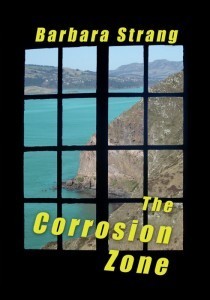 On Wednesday 9, the Christchurch poetic community enjoyed a long-awaited launch—in this case for Barbara Strang's The Corrosion Zone (HeadworX), which was published earlier this year but had its launch deferred by the February 22nd earthquake.
On Wednesday 9, the Christchurch poetic community enjoyed a long-awaited launch—in this case for Barbara Strang's The Corrosion Zone (HeadworX), which was published earlier this year but had its launch deferred by the February 22nd earthquake.
But the creative and celebratory, as well as other aspects, of Christchurch life are starting to pick up, so it felt good to be going to a launch again. Doubly good in this case, since Barbara asked me to give the launch speech for her book—and being asked by another writer to help launch their work into the world is a great privilege.
There's been a slight delay, but for today's post, I thought I'd share what I had to say, together with a few photos of the event.
—
Launching The Corrosion Zone
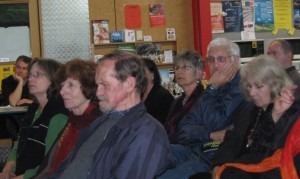
Launch audience
"As I said on my blog on September 20, when Barbara kindly allowed me to feature Indigo as my Tuesday Poem, I initially approached The Corrosion Zone with mixed hesitation and anticipation. Although the collection is new, I was aware that I had already encountered several of the poems as works-in-progress when we were both part of the Friday poetry group.
So the hesitation was because I feared over-familiarity, the anticipation because I know just how good a poet Barbara is.
As I also said then, all hesitation quickly disappeared as soon as I immersed myself in the collection. For there are indeed some very fine poems within these covers and several sequences, such as the poems about Barbara's younger brother, Andrew, that were completely new to me.
I think it is no secret that this is a collection where many of the poems deal with very personal subjects: the unraveling of a marriage and then it's dissolution, including the loss of one home, with all its associations of relationship and family, and relocation into a new environment. There are also poems about loss of family members, with one sequence focused around Barbara's father, his life and death, and another centered on the suicide of her youngest brother, Andrew.
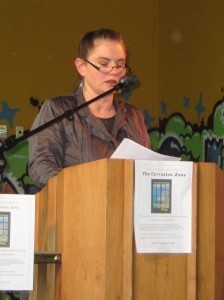
Speaking the "good words"
There is a clear chronological sense to the sections within The Corrosion Zone, effectively charting these events. "On Godley Head" traverses both the sense of unease in Barbara's marriage and the loss of Andrew. "Hearts" charts the marriage break up; "Postures of Falling" is primarily about its aftermath although the section also incorporates the sequence on Barbara's father. Finally there's "Open Home" – but I shall return to that section of the book later.
Marriage break up and suicide, loss of home and loss of family members – these are among the biggest human traumas outside of war and cataclysmic disaster. Although we may not, as individuals, have vigiled on all these emotional shores, most of us will have traversed some—and understand that each one, on its own, is a psychological and emotional "major" for any individual to deal with.
Those of us who are also poets will know the risk that these sorts of experiences give rise to: that of the "diary entry" poem — verse as an emotional outlet and outpouring, therapeutic perhaps, but rarely good poetry. The poet is too close to the material, the hurts too raw for objectivity and clarity.
Perhaps a part of my trepidation on first opening The Corrosion Zone was fear that the collection would founder on poems of this kind. The poet, editor, and critic, John O'Connor, has specifically addressed this risk in his consideration of the book and I would like to share his words with you:
"[ The Corrosion Zone primarily] … deals with … two occurrences that had as profound an effect on … [Barbara] … as it is possible to have … [and many] of the poems were written fairly shortly after the events they draw on. It is amazing to me that this was possible. Usually a long time is necessary from traumatic events before sufficient distance can be gained to allow focused writing to take place. … This isn't a matter of technique – although that necessary distance may be expressed in technical terms – rather it's a matter of emotional control, of spiritual maturity … "
John's conclusion is that Barbara has managed to pull this difficult feat off:
"… she has … managed … to turn the facts of heartache and grief into quite luminous poems. They work, they work at times as well as poems can work …"
Those of you who know John O'Connor and the exacting poetic standard he sets, will understand that this is high praise indeed.
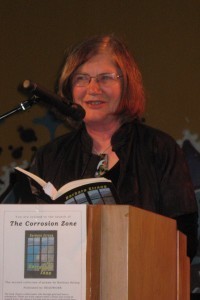
Barbara Strang Reading from "The Corrosion Zone"
I heartily endorse both the praise and the conclusion—Barbara has pulled it off. The collection traverses difficult emotional terrain yet it is never indulgent—but rather spare, wry, and poignant in its understated reserve.
"Yes," you may say, "but still—surely The Corrosion Zone must, as a collection that focuses on grief and loss, prove attendingly difficult to read?"
To which I reply: Not so. Not in my opinion. Yes there is grief and loss—how not?—but that is by no means all that The Corrosion Zone is. It is not even the greater part of what it is.
So what is it?
.
The collection begins with unease in the poem On Godley Head, where:
"Once we two
forged a path
through untouched forest"
but ends wondering:
"Can we hold hands
and love the wreck
of this land, the skeleton."
Here we have layers of meaning, an amalgam of poetic subtlety and mystery, while in First Summer, the lines are more direct:
"The opening of
the new century …
… when we hoarded secrets
and bank balances …
… the summer when
I asked questions
and you & I
no longer added up."
And again, in Breaking Point:
"The easterly hustles in …
ragged clouds flee …
Over the road
concrete trucks rumble
machines claw down trees."
The un-ease remains, but the reader then experiences the collection's first transition, into the gentler sequence around Barbara's brother, Andrew. Loss and grief is there in the lines, as in Reading Andrew's Poems:
"I read the words this morning
of one whose summer did not come"
and in Back in the garden with cabbage tree flowers:
"Now you're deep in the soil
at Deborah's Bay
there is nothing to see
on the port green hill" …
… Unwinding the clock work
finding the escape
wheel – if we could."
But I think there is something much more here than just grief and loss. These poems are a testament: to Andrew, as in the poem Fatigues:
"Often in Dunedin I notice
a tall young man
who looks like you
But also, I feel, to Barbara. And to relationship: eldest sister; youngest brother. They're about love:
"If you had asked me
You could have come to stay …
… I'd have rescued you
like an injured bird
kept you in the airing cupboard
till you'd recovered"
And there are many poems with layers, not least Old Pet in the "Postures of Falling" section:
"Molly is not sleek any more
she is middle-aged
and shows it …
… she is past her best
I know it
…
She lies all day in the garden
Her rusty coats blends with the weeds
I hardly notice her.
She and I
in the large backyard –
and only me to miss her."
Understated, spare, poignant – as much because of what the poem does not say, as what it does.
There are many other observations I can make in praise of The Corrosion Zone, including Barbara's acute observational eye for detail, particularly of the natural world, which pervades the poem. And the many wonderful lines, like those that conclude the poem Indigo:
" … Indigo
a blue as
deep as your eyes,
the lashes a flight of geese
on the last stripe of blue as the
sky plunges towards night."
Often though, the key to a collection can be found, not in the opening poems or mid-part lines, but in the closing sequence. In this sense, I feel that the final section "Open Home" unlocks our understanding of The Corrosion Zone.
It is here, I believe, we find the poems that epitomise The Corrosion Zone 's theme of transition, as in Between the Acts:
"Putting it behind,
the old house …
… pulling down the blinds
lingering in the
stillness between
the acts"
and Open Home:
"I looked out the windows
and saw for the first time
flickering branches in the sun …
…
I opened the doors
and stepped out,
measured during a long breath
the bird-filled quiet."
Transition, yes, but also a sense of continuity, as in The Wait:
Over the channel
this morning
you can see them
the godwits on the spit
…
The sand is high this year
the sun needling the fog
as they wait
for a signal,
the days to draw in
the constellations
to configure."
Transition, continuity — but at the end there is something more again when we take The Mount Pleasant Bus:
"… The sunset plays over us; the details of our lives fall away. Aiming for home, I am being taken on a longer journey."
Yes, I think: yes. Unease and transition, love and continuity—in the end The Corrosion Zone as a whole is a testament: to being here and being human.
But most of all, I believe, it is a testament to Barbara."



